Feb 2016
Netflix makes room for Fuller House (and well, why not?)
02/24/16 02:13 PM
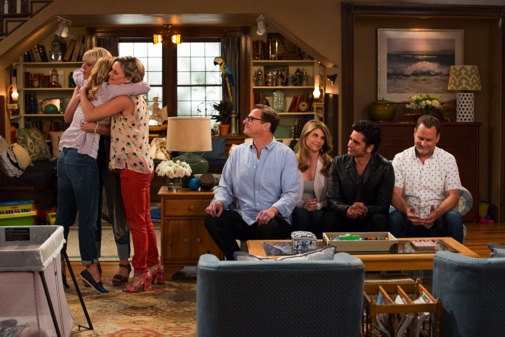
Premiering: All 13 Season One episodes begin streaming Friday, Feb. 26th on Netflix
Starring: Candace Cameron Bure, Jodie Sweetin, Andrea Barber, Elias Harger, Soni Nicole Bringas, Michael Campion, Dashiell/Fox Messitt, with recurring appearances by John Stamos, Bob Saget, Dave Coulier, Lori Loughlin
Produced by: Jeff Franklin, Tom Miller, Bob Boyett, John Stamos
By ED BARK
@unclebarkycom on Twitter
It’s safe to say -- boy, is it ever -- that the revival of Full House is not being greeted by the TV critic community with the same bow-down reverence reserved for Arrest Development’s sacred second coming.
In each case, Netflix is the nurturing mothership, with the slightly retitled Fuller House arriving on Friday, Feb. 26th with all 13 Season One episodes. At the risk of being declared certifiable, Fuller House turns out to be better realized than Fox’s recently concluded six-episode serving of The X-Files, a thudding dud that burned the gullible faithful with yet another spaced out cliffhanger.
At least Fuller House knows what exactly what it’s all about. Then and now, it’s a broad, intendedly feel-good family sitcom replete with group hugs, familial bonding, cute, scene-stealing little kids and telegraphed life lessons. The studio audience does its part, too, with recurring cheers, applause, awwwww’s and oooooh’s.
Original Full House creator Jeff Franklin doesn’t tamper with any of this. There’s nary an ironic or cynical moment to be had in the first six episodes made available for review. The closest approximation to snark comes when Episode 1 notes the absence of Mary Kate and Ashley Olsen, the only original cast members who have taken a pass.
“Michelle (dually played by the Olsens) sends her love, but she’s busy in New York running her fashion empire,” Bob Saget’s Danny Tanner notes at a family gathering. The entire cast then gives the audience a prolonged “look” before John Stamos’ still hunky “Uncle Jesse” says, “Damn, we all look good.”
Stamos, Saget, David Coulier as Joey Gladstone and Lori Loughlin as Jesse’s wife, Rebecca, will appear only intermittently. All are on hand for the extended opening episode before Stamos makes a return solo appearance in Episode 2 and Coulier is on his own in Episode 3 (which turns out to be the best of the opening bunch). None of them are in Episodes 4-6, which actually serves Fuller House well in its efforts to survive on its own with Danny’s young adult daughters, Donna Jo and Stephanie (Candace Cameron Bure, Jodie Sweetin), plus their dorky, intrusive childhood friend, Kimmy Gibbler (Andrea Barber).
Bure, Sweetin and Barber are all reprising these roles with an enthusiasm that befits three actresses whose careers otherwise had been largely dormant since Full House left ABC in 1995 after an eight-season run.
Donna Jo, now a veterinarian, has turned out to be as unlucky in love as her widowed dad. She’s likewise been left to raise three young children on her own after her firefighter husband died on the job. Sister Stephanie, single and spilling out of party dresses, has become a successful club deejay who mostly works abroad. Kimmy, separated from her philandering husband, Fernando, is trying to keep her teenage daughter happy.
But everyone’s home for Danny’s going-away party. He’s relocating from San Francisco to Los Angeles after being hired as co-host of a morning talk show with his new wife. This has prompted him to sell the family homestead, where Donna Jo lately has been living. Awwwww. But of course that’s not going to happen after everyone overhears Donna Jo lamenting her fate. How can she possibly go it alone and care for oldest son Jackson (Michael Campion), pint-sized Max (Elias Harger) and drooling little baby Tommy (Dashielle and Fox Messitt)?
Stephanie, Kimmy and her daughter, Ramona (Soni Nicole Bringas), save the day by moving in and pretty much replicating the show’s original setup. But before that happens, Uncle Jesse sings “Forever” to wife Rebecca, replicating what the real life Stamos has done on occasion with The Beach Boys. This turns out to be a grindingly awkward moment -- even for Fuller House. But Max is around to pick up some of the slack with his oft-deployed array of little boy one-liners. In Episode 1, they include, “Relax, mom, I already know the bad words. Darn, booger and Donald Trump.”
Harger as Max seems to improve his delivery episode by episode. He’s genuinely amusing on a fairly consistent basis, particularly when trying to pick out a puppy in Episode 4.
Kimmy’s daughter, Ramona, of course is prototypically miserable at first. Aghast at moving in with a big passel of white people, she equates Donna Jo, Stephanie and the kids to “albino polar bears drinking milk in a snowstorm watching Frozen.” The episode was filmed well before the oft ham-handed writers could work in a reference to the Oscars.
Episode 3 so far is the most guest star-centric, working in appearances by Macy Gray and Maks and Val Chmerkovskiy from Dancing with the Stars (where Bure competed in 2014 and finished third with pro partner Mark Ballas). This is a fun and highly energetic half-hour, with Coulier’s Joey flying in from Vegas to babysit while Donna Jo gets a needed night out with Stephanie and Kimmy as part of the latter’s “she-wolf pack.” Back home, Joey successfully teaches the kids how to have fun with something other than their electronic “devices.”
Fuller House isn’t going to win any awards for being exactly what its predecessor was -- an utterly formulaic sitcom that ranked among prime-time’s 20 most popular series in four of its eight seasons. But seriously, it’s a surprise to see how well the grown-up Bure, Sweetin and Barber work together in the service of a show that employed them as kids, cast them off and now is welcoming them back instead of recasting.
Netflix has several “smarter” original comedies in its growing stable, including newcomers Master of None and Love. But young kids can’t watch those thoroughly adult shows -- unless they have ridiculously permissive or absentee parents. Pretty much anyone can watch Fuller House -- and there should still be a place for that.
The first six episodes have a handful of double entendre jokes. And little Billy’s puberty might be accelerated in Episode 1 by the sight of Sweetin in a less than chaste party dress. But this is still a show where “Bring it in” signals a trademark group hug. So maybe we can all just get along with that and let Fuller House serve the audience that’s happy to see it back. Believe it or not, that audience still exists -- maybe more so than many of us TV critic types would like to think.
GRADE: C+
Email comments or questions to: unclebarky@verizon.net
Getting his due: Fats Domino makes his American Masters debut
02/24/16 11:36 AM
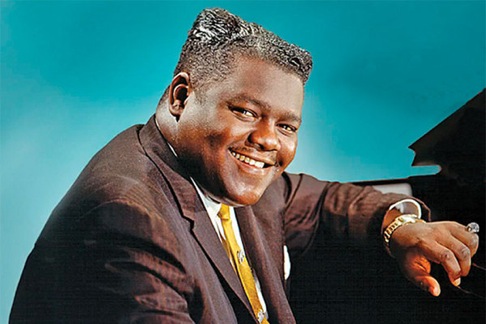
By ED BARK
@unclebarkycom on Twitter
Given contemporary sensibilities, he might have first made the scene today as “Plus-Sized” Domino.
But Antoine “Fats” Domino, Jr. embraced his nickname from the start and has never tried to shed it with any Weight Watchers commercials. What you see is what he’s got. And the chart-topping, New Orleans-born, boogie-woogie heavyweight deservedly gets PBS’ American Masters treatment in Fats Domino and the Birth of Rock ’n’ Roll. It premieres on Friday, Feb. 26th at 9 p.m. (central), a date that coincides with Domino’s 88th birthday.
His halcyon years were the 1950s, a decade he began by selling one million copies of “The Fat Man,” a variation of Champion Jack Dupree’s “Junker’s Blues.” Domino’s label was Imperial Records. Together they prospered with 37 top 40 singles, including “Ain’t That A Shame” (almost immediately homogenized by Pat Boone), “I’m Walkin’, I’m In Love Again, Walkin’ to New Orleans,” and his signature “Blueberry Hill,” earlier recorded with little impact by both Gene Autry and Louis Armstrong.
“The year 1956 belonged to Fats Domino,” says narrator Clarke Peters.
Riding a hot streak of sold-out tours and TV appearances, Domino’s chart-topping years pretty much went down for the count in the 1960s, when a “British Invasion” led by The Beatles and The Rolling Stones overwhelmed many an American rocker. But The Beatles loved him, and the film includes a black-and-white picture of John, Paul, George and Ringo looking very happy to have Fats in their presence.
Domino’s road shows could be powder kegs at times. Biographer Rick Coleman says “he had more riots than any other rock ’n’ roller, maybe ever.” Fats’ crossover appeal was the root cause, Coleman says. “They were mixing alcohol, plus dancing plus the races together for the first time in a lot of these places.”
The hit TV variety shows of that era, all hosted by white men, also wanted a piece of Fats. He performed for Steve Allen, Perry Como and Ed Sullivan among others, with the latter ridiculously putting Fats’ band behind a curtain in the interest of showcasing him alone at his piano on the night of Nov. 18, 1956.
Bandleader/trumpet player Dave Bartholomew, instrumental in producing and co-writing many of Domino’s hits, is described at one point as “the boss with the hot sauce.” Bartholomew and saxophonist Herb Hardesty led a horn section that helped to cook Domino’s hits to perfection. One of the delights of this film is seeing and hearing them in their full-blown glory. The producers also are smart to let “Blueberry Hill” play in full, with Fats in his prime wailing at the piano while sweating profusely.
All these years later, “It still does the trick,” veteran New Orleans-based pianist Jon Cleary says of Domino’s boogie-woogie infused keyboard riffs. “It does the trick because it’s really good.”
Fats Domino still resides in New Orleans after some believed him to be dead when Hurricane Katrina flooded his beloved Lower Ninth Ward in 2005. But although he doesn’t perform in public anymore, he still gets out and about from time to time. His last top 100 single was a 1968 cover of The Beatles’ “Lady Madonna,” which Paul McCartney wrote in appreciation of Domino’s style.
The Domino effect can be felt anew in this lively, evocative hour. It goes by too soon, as did his days as a hit-making machine. But he never liked touring all that much, preferring to be back in New Orleans with his wife, Rosemary, who died in 2008. They were married for more than 50 years and had eight children, none of whom are interviewed in this film. Fats didn’t much like to be interviewed either after the spotlight dimmed. He preferred the comforts of home after making his fortune in times when he helped to build the very foundation of rock ’n’ roll with Elvis Presley, Chuck Berry, Jerry Lee Lewis and Little Richard.
Only “The King” has gone down for the count. If only someone could get the surviving quartet back together again.
GRADE: B+
Email comments or questions to: unclebarky@verizon.net
BBC America's Prey at least will cut to the chase
02/24/16 09:28 AM
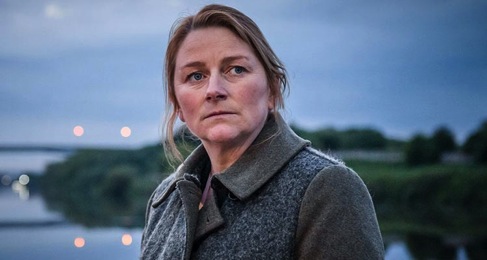
Premiering: Thursday, Feb. 25th at 9 p.m. (central) on BBC America
Starring: Rosie Cavaliero, John Simm, Craig Parkinson, Anastasia Hille, Benedict Wong, Struan Rodger
Produced by: Nicola Shindler, Chris Lunt
By ED BARK
@unclebarkycom on Twitter
Rather than play cat-and-mouse for multiple seasons with no end in sight, BBC America’s Prey resolves itself in just three weeks before moving on to another entirely different catch.
In this case, that makes it an extended “procedural” that’s more than run of the mill. At its center is Detective Sergeant Susan Reinhardt (Rosie Cavaliero), a plump, snack-loving divorcee who puts two and two together and tries to make it all add up.
An ongoing onslaught of new programming, whether on TV or from increasingly prolific streaming services, makes it nigh unto impossible to watch each and every episode made available for review. So I’ve made do, in this instance, with watching the three-hour first case, which concludes on March 10th.
These episodes hold interest without being riveting. But Cavaliero is compelling as a dogged, under pressure gumshoe who in this case might remind some seasoned TV watchers of Lt. Philip Gerard from The Fugitive. The wrongly accused escapee, who takes flight from a flipped-over paddy wagon rather than a derailed train, is Detective Constable Marcus Farrow (John Simm). Separated from his wife but trying to reconcile with her, he remains a doting father of their two sons. So imagine his horror when only his older son survives a home invasion shortly after an angry Farrow has punched a hole in a kitchen wall after learning his wife is seeing another man.
Reinhardt is quick -- too quick, really -- to deduce that Farrow did it. His escape triggers a manhunt and a series of other narrow escapes while Farrow looks for the real killer or killers. It’s all tied to a decomposing dead body discovered earlier in the game. But what are the connections and who’s covering them up?
Simm is rock-solid from the start as Dr. Richard Kimble, er, detective Marcus Farrow. Cavaliero comes to the fore later in this twisting, turning whodunit, which is spiked with enough chase scenes to merit BBC America’s “high-octane thriller” billing.
In the end, though, viewers aren’t likely to be blown away by either the intrigue or the action. Some of the puzzle pieces don’t fit as snugly as they should in Prey, which can be a bit all over the place even when Marcus isn’t running to and fro. But at least you’ll get a resolution in return for a relatively short investment. Then it’s on to another case with all new principals save for Cavaliero’s Reinhardt. She’s the lone constant on both sides of the law, giving this series a character who still seems worth getting to know better.
GRADE: B
Email comments or questions to: unclebarky@verizon.net
Carole King again crowned queen in one fine American Masters tribute
02/19/16 10:28 AM
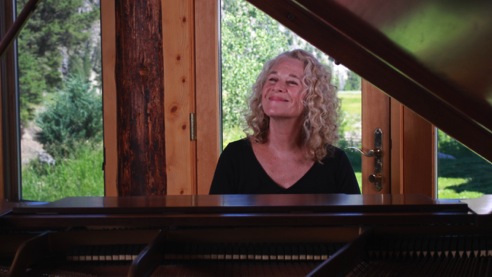
By ED BARK
@unclebarkycom on Twitter
At this point, the life and times of Carole King might seem a little played out from a public recognition standpoint.
Summations of her exemplary singer/songwriter career have been bountiful in recent years. In 2013 she became the first woman to receive the prestigious Gershwin Prize For Popular Song. PBS televised the ceremony, with President Obama as presenter.
Late last year, King joined the latest batch of Kennedy Center honorees, with a short biographical film included in the annual CBS telecast.
Beautiful: The Carole King Musical remains a big Broadway hit in the mold of The Four Seasons’ saga in Jersey Boys.
In that context, PBS’ American Masters series is more than a bit late to the party with its one-hour Carole King: Natural Woman. Even so, this is a very entertaining jaunt replete with striking vintage footage and photos (imagine Paul Simon with a thick shock of hair), plus the sheer strength of the musical catalog authored by King on her own and earlier in a storied collaboration with husband Gerry Goffin. It premieres on Friday, Feb. 19th at 8 p.m. on KERA13 locally.
“You’ve Got a Friend” has emerged as her anthem after first being heard on King’s breakthrough 1971 solo album Tapestry. But there’s so much more, much of it from the days when she wrote the melodies and Goffin penned the lyrics for songs that became big hits for others. “Will You Love Me Tomorrow” by The Shirelles. “Up on the Roof” by The Drifters. “One Fine Day” by The Chiffons. “Pleasant Valley Sunday” by The Monkees. “I’m Into Something Good” by Herman’s Hermits. “The Loco-Motion” by Little Eva. “Take Good Care of My Baby” by Bobby Vee. And of course, “(You Make Me Feel Like) A Natural Woman” by Aretha Franklin.
That’s just naming a few. King, who now mostly lives in Idaho, also recalls the thrill of having The Beatles cover “Chains” after Little Eva’s backup singers, “The Cookies,” had a top 20 hit with it.
King was pregnant and both were teenagers when she married Goffin in 1959. They divorced a decade later after his infidelities piled up. Natural Woman makes no further mention of what became of Goffin, who died in 2014. But he managed to write a few more hits without King, including “Saving All My Love For You,” recorded by Whitney Houston.
Competing with the King-Goffin team were Barry Mann and Cynthia Weil, both of whom are interviewed for the American Masters film. Mann says they were all close friends behind the scenes, but foes in the cutthroat music business. Both duos aimed to have the next big hit, and they often churned them out on literally a day’s notice.
“I hate the word ‘factory.’ I really hate it,” Mann says. “It was a songwriting school.”
King recorded Tapestry shortly after moving to Los Angeles and becoming close pals with James Taylor.
“We had a common mind, you know,” he says of their collaborations. King credits Taylor with encouraging her to perform in public. Her coming out party was at Doug Weston’s Troubadour, where the so-called “singer-songwriter movement” of the 1970s blossomed in full.
Some of the best moments in Natural Woman are from an earlier interview with an expansive, considerably younger King. She’s at the piano and appears to be fully at ease whether talking about her music or playing it.
The songs have never stopped resonating while King, 74, basks in the afterglow of major awards and tributes. The American Masters film is more icing on her cake. And as it turns out, it’s still not too late, baby.
GRADE: B+
Email comments or questions to: unclebarky@verizon.net
Judd Apatow's Love gives Netflix another distinct pleasure
02/18/16 01:03 PM
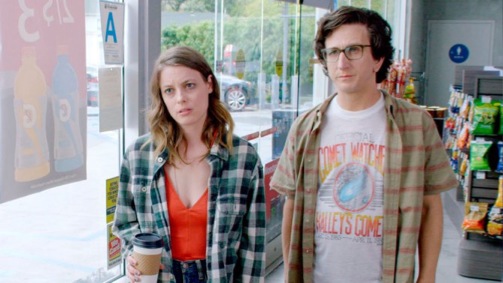
Occasionally happy together: Gillian Jacobs and Paul Rust of Love. Netflix photo
Premiering: All 10 Season One episodes begin streaming Friday, Feb. 19th on Netflix
Starring: Gillian Jacobs, Paul Rust, Claudia O’Doherty, Briga Heelan, Brett Gelman, David King, Dave Allen, Steve Bannos, Chris Witaske, Chantal Claret, Iris Apatow, Tracie Thoms, Jordan Rock
Produced by: Judd Apatow, Paul Rust, Lesley Arfin, Brent Forrester, Dean Holland
By ED BARK
@unclebarkycom on Twitter
It’s been standard TV sitcom procedure for the loud, plus-sized guy -- OK, the blustering fatso -- to get the slimmer, pretty girl.
Jackie Gleason (The Honeymooners), Jim Belushi (According to Jim), Kevin James (The King of Queens) and Mark Addy (Still Standing) have been among the numerous beneficiaries.
Netflix’s Love, which begins streaming Season One’s 10 episodes on Friday, Feb. 19th, deals from the same playbook but sharply alters the male physicality. This time it’s a thin, plain-faced, bespectacled, soft-spoken nebbish with the full name of Gus Cruikshank (Paul Rust) who eventually becomes alluring to a messed-up beauty named Mickey (Gillian Jacobs from Community).
Their rather desperate lives and disparate dynamics, with a strong supporting cast in tow, make Love a consistently involving crash course. Netflix thinks so, too. It’s already ordered a Season Two of co-creator Judd Apatow’s (The 40-Year-Old Virgin, Knocked Up) first fully hands-on TV series since 2001’s Undeclared. His principal creative partner is Rust, whose witty, but wan 31-year-old Gus is dumped in Episode 1 by a girlfriend who just can’t take his supposedly “fake” niceness anymore.
Mickey has the opposite problem. An addict on several levels, she invariably ends up severing relationships by spewing venom. The extended first episode works hard at being off-putting with its fusillade of f-bombs and other unsavory moments. And while Mickey fires away, Gus screws up a gift, three-way bedroom scene that frankly strained credulity anyway. By the end of the opener, however, Gus and Mickey are chance-meeting at a convenience store. His act of benign kindness puts Love in motion as a study of two opposites who attract, repel and bring out the best/worst in each other.
“So in a year you’ll be as old as Jesus when he died,” Gus tells Mickey upon learning she’s 32. Woody Allen will be envious when he hears that line.
Gus otherwise is a tutor on the set of the cheesy supernatural TV series Witchita. His main pupil is 12-year-old Aria (Apatow’s daughter, Iris Apatow), who has him wrapped around her oft-petulant little finger. Mickey is a program manager at a satellite radio station, where she must endure taskmaster host Dr. Greg (Brett Gelman) and his phony Heart Work call-in show.
A major third wheel of Love is the chipper Australian Bertie (Claudia O’Doherty), who moves in with Mickey and her cat, Grandpa. Initially written as wide-eyed and naive, Bertie becomes something considerably more than that. Also written somewhat inconsistently is a knockout Witchita actress named Heidi (Briga Heelan). Her growing relationship with Gus seems to be grounded in genuine gratitude for his tip on how not to get written out of Witchita. But Love is too obvious in this respect -- and then too abruptly cynical down the stretch.
There are many little pleasures, though. Gus, an aspiring scriptwriter, has a group of friends who occasionally get together to improvise closing credit theme songs for movies that didn’t have them, including The Perfect Storm and Carlito’s Way. These particular scenes are a lot of fun, as is an Episode 4 segment in which Gus makes a winning impression despite himself by leading an impromptu party band in an exuberant cover of “Jet.”
Love for the most part loses it in Episode 6, though. The needless, real-life Andy Dick plays himself as a -- what else -- over-indulger in everything. Mickey is along for the ride on an impromptu binge that seems to go on interminably and for the most part, inconsequentially. But Episode 7 then fully recovers with Mickey’s and Gus’s excursion to L.A.’s The Magic Castle, of which he’s a devoted member.
The set of Witchita is pretty much a Hollywood cesspool epitomized by the show’s coldly efficient executive producer, Susan Cheryl (a very effective Tracie Thoms). But one saving grace is a true-blue craft services guy named Kevin (Chris Rock’s younger brother, Jordan Rock). “Nothing dries up a vagina more than a paragraph, man,” Kevin says in instructing Gus on the art of texting seductively. In his own way, he’s speaking from the heart.
Rust and Jacobs are the drive shafts, though, keeping Love on all fours with characterizations that likely will keep most viewers invested. Netflix made all 10 Season One episodes available for review, with the majority of them extending past the 30-minute mark. But I got sucked in, watched them all, and didn’t feel suckered in the end. Wherever Mickey and Gus are going seems worth the extended trip. Love is a many-spindled thing. But its smooth/sharp edges keep it in a groove.
GRADE: B+
Email comments or questions to: unclebarky@verizon.net
Hulu's 11.22.63 goes through the rabbit hole to that awful day in Dallas
02/12/16 11:54 AM
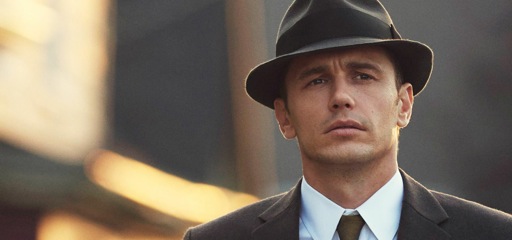
Premiering: Monday, Feb. 15th on Hulu
Starring: James Franco, Chris Cooper, Sarah Gadon, Daniel Webber, George MacKay, Lucy Fry, Cherry Jones, Josh Duhamel, Leon Rippy
Produced by: J.J. Abrams, Stephen King, Bridget Carpenter, Bryan Burk
By ED BARK
@unclebarkycom on Twitter
A handsome, divorced high school English teacher seeks to stop the assassination of President John F. Kennedy by time-traveling through a mysterious, secret portal in a retro Lisbon, Maine diner.
OK, perhaps this isn’t quite as far-fetched as some conspiracy theories. But it’s certainly a different way of yet again revisiting that very dark day in Dallas.
Partly filmed in and around Dealey Plaza but mostly shot in Canada, Hulu’s eight-part 11.22.63 is adapted from Stephen King’s 2011 bestseller, 11/22/63. The entire miniseries was made available for review, and yes, it’s quite a trip. A satisfying and surprisingly sweet payoff arguably trumps some meandering side trips and preposterous plotting (even within the context of this overall oddball premise). Unlike fellow streamers Netflix and Amazon Prime, Hulu subscribers will be fed one episode per week rather than the whole thing at once. The extended opening chapter, subtitled “The Rabbit Hole,” arrives on Monday, Feb. 15th, which not coincidentally is also President’s Day.
James Franco, still very much known for his sleepy co-hosting of the 2011 Oscars, invests himself fully in the role of Jake Epping turned Jake Amberson after he’s transported back to Oct. 21, 1960 (for some reason the one and only date available). So he’ll have to bide his time before tracking Lee Harvey Oswald to the night of April 10, 1963, when he allegedly tried to kill conservative activist and former general Edwin Walker. Epperson’s directive, from grizzled, dying diner owner Al Templeton (Chris Cooper), is to kill Oswald if in fact he fired at Walker with the same rifle used on Nov. 22, 1963.
Templeton previously tried to accomplish this mission on his own, but all of his back-and-forth efforts failed. There’s this, too. Once you return to the present, anything changed in the past will be erased if you make a return trip to Oct. 21, 1960. Also be wary of the “past pushing back” rather than idly letting itself be manipulated. It’s always something, isn’t it?
After landing in Lisbon, Franco’s Jake slowly makes his way toward little Jodie, Texas and a new high school teaching job. But first there’s a side trip to Kentucky, where he hopes to avert another murder that came to his attention during 2016. This enables Jake to pick up high-strung wayward teen Bill Turcotte (George MacKay) as a problematic sidekick.
The requisite love interest is blonde, beautiful Sadie Dunhill (Sarah Gadon), who’s also new to the Jodie High faculty. Unfortunately she has a very troubled past that comes to the fore in a gratuitously gruesome Episode 5. This is the point where 11.22.63 almost goes entirely off the rails.
Meanwhile, Jake and Bill keep managing to move into or very close to the multiple residences occupied by Lee Harvey and Marina Oswald (Daniel Webber, Lucy Fry). Their primitive spying equipment is used to overhear both the Oswalds and frequent visitor George de Mohrenschildt (Jonny Coyne), a real-life, older Russian emigre who suspiciously has befriended the couple. Is he part of a conspiracy to kill the President?
(This is the same guy who committed suicide in March, 1977 while Bill O’Reilly claims to have heard him do it while outside the door of de Mohrenschildt’s daughter’s Palm Beach, FL home. O’Reilly, a reporter at the time for Dallas-based WFAA-TV, re-told this anecdote in his 2012 Killing Kennedy bestseller. And he’s steadfastly stood by this thoroughly discredited story after his colleagues at the time say he never reported anything for WFAA on the suicide and in fact was in Dallas when it happened.)
11.22.63 sprinkles in other real-life characters. Jack Ruby (Antoni Corone) is briefly seen in Episode 3 when Jake and Bill visit his Carousel Club. And the late FBI agent James Hosty (Gil Bellows) is portrayed as a demonic, evidence-manipulating interrogator in the climactic Episode 8. It all makes for a wild, careening denouement that both strains all credibility and then regroups to tug at heart strings. It’s tempting to get more specific, but let’s pull back. Save to say that those who haven’t read King’s book yet should be prepared for anything and everything.
King and J.J. Abrams (Star Wars: The Force Awakens) are the principal executive producers of this concoction. It originally was planned as a feature film directed by Jonathan Demme, but King reportedly clashed with him over content. The resultant miniseries is buoyed by an effective performance from Franco, whose character’s frequent hard-core profanity will be included in both the commercial-free and commercial-interrupted versions available to subscribers, according to a Hulu spokeswoman.
Whether cursing, welling up with tears or being beaten to a pulp, Franco is game to go the distance in a thoroughly tall tale that also has a solid performance from Gadon in the key role of Sadie. Together they persevere toward Nov. 22, 1963 in hopes of saving that day and thereby making the future a much better place. Story-wise, this turns out to be a very bumpy ride. But despite its flaws, 11.22.63 ends up closing the deal in a way that for the most part makes it a long, strange time travel worth taking.
GRADE: B-minus
Email comments or questions to: unclebarky@verizon.net
Better Call Saul won't be rushed in the early stages of Season 2
02/11/16 01:23 PM
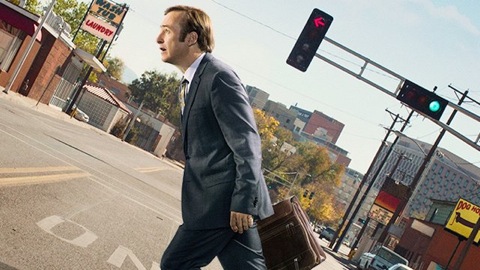
By ED BARK
@unclebarkycom on Twitter
Two very verbal, slow-cooked episodes open Season 2 of AMC’s Better Call Saul.
Depending on your tolerance for extended dialogues, they’re either deliciously chewy or perhaps in need of a little pick-me-up. I’ll side with the leisurely pace en route to Bob Odenkirk’s scam-prone Jimmy McGill eventually becoming one of TV’s ultimate shysters, Saul Goodman, in the late, great Breaking Bad. As origin stories go, Better Call Saul is still too savory to hurry along.
The 10-episode Season 2 begins on Monday, Feb. 15th at 9 p.m. (central). Jimmy has been offered a lucrative job at Santa Fe’s Clifford & Main law firm after uncovering evidence of a grand scheme by the owners of Sandpiper Landing to bilk the community’s elderly, trusting residents. But the case must still be proven in court while Jimmy weighs whether to live like a king or go rogue in the interests of his “mid-life clarity.”
As with Season 1, viewers will first see the present-day Saul in hiding as the hands-on mustachioed manager of a mall-encased Cinnabon store. Lasting for a little over five-and-a-half minutes, this entire interlude is filmed in evocative black-and-white. Let’s just say that Saul gets himself in a predicament before eventually leaving a lasting mark. Then it’s on to the Better Call Saul theme song, which again will be accompanied by different visuals for each episode.
The first two hours, again set in 2002, train their sights on Jimmy and the two other principal characters in Better Call Saul’s triangle. Former cop Mike Ehrmantraut (Jonathan Banks) continues to work as a parking garage toll taker while slowly beefing up his side businesses. Lawyer Kim Wexler (Rhea Seehorn), still employed by the upper crust Hamlin, Hamlin & McGill firm, remains intent on salvaging Jimmy while he yearns to make their occasionally intimate relationship a keeper.
Also included in a major way is Mark Proksch as an apprentice, milquetoast of a drug dealer who first appeared last season in the “Pimento” episode. Better Call Saul’s opening hours are significantly tied to his new dilemma. And Jimmy’s efforts to make it go away take quite a unique turn in Episode 2.
These episodes aren’t shot out of a cannon the way Season 1’s were. There’s little sense of menace and ample time spent floating in a pool -- literally. But the opening hour’s eventual scam proves to be a nice payoff after a considerable buildup. And an extended, textured scene at the outset of Episode 2 looks deeper into the fortress of solitude that still grips but no longer paralyzes Jimmy’s mostly shut-in older brother, Chuck (Michael McKeon).
An exchange later in Episode 2 pretty much sums up where we’re eventually going here.
“You still morally flexible?” Mike asks Jimmy over the phone. “If so, I might have a job for you.”
“Where and when?” Jimmy replies.
I’m still roped in by a series whose little moments can also be mini-monuments on various roads to perdition. Creator and executive producer Vince Gilligan isn’t afraid to let it all air out at a measured pace. But Better Call Saul is still avoiding the pitfalls of simply running in place. Instead, great expectations remain intact for a Season 2 that so far continues to make its mark by delivering just a little at a time.
GRADE: A-minus
Email comments or questions to: unclebarky@verizon.net
The music of their lives: HBO's Vinyl is a trip that sometimes trips
02/10/16 10:29 AM
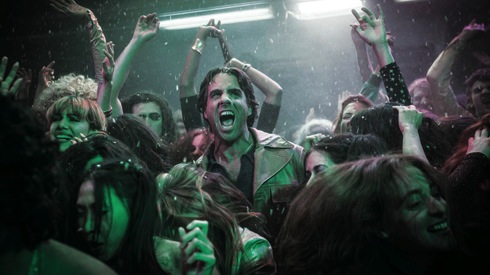
Premiering: Sunday, Feb. 14th at 8 p.m. (central) on HBO
Starring: Bobby Cannavale, Olivia Wilde, Ray Romano, Max Casella, Ato Essandoh, P.J. Byrne, Juno Temple, J.C. MacKenzie, Jack Quaid, James Jagger, Paul Ben-Victor, Annie Parisse, Ken Marino, Daniel J. Watts
Produced by: Martin Scorsese, Mick Jagger, Terence Winter, George Mastras, Rick Yorn, Victoria Pearman, Emma Tillinger Koskoff, John Melfi, Allen Coulter
By ED BARK
@unclebarkycom on Twitter
Mobsters and Martin Scorsese go together like cake and ice cream, chips and dips, Donald Trump and egomania.
So the maestro behind Goodfellas, Mean Streets, Casino, Gangs of New York and Boardwalk Empire invests HBO’s Vinyl with a strong gangster vibe during the course of recreating New York City’s raucous, drug-and-booze-powered 1970s music scene. It’s an industry where hit records aren’t the only hits. And where payoffs, coverups, stealing and dirty dealing are business norms.
Scorsese and principal co-executive producer Mick Jagger for the most part get away with all of this sound and fury, even though some of Vinyl’s excesses are more over the top than Liberace’s closet. He’s yet to be seen in the five episodes made available for review, including Sunday’s extended two-hour pilot. But a mockup of Robert Goulet makes the scene in Episode 4, recording a take-the-money-and-run Christmas album for Richie Finestra’s (Bobby Cannavale) cash-strapped American Century Records. Season One will have 10 episodes.
First seen sweating, drinking and on the prowl for a cocaine fix, Cannavale gives a consistently manic performance as the high-strung, profane founder of a company that’s been running out of cachet and bankable artists. But in terms of loathsome, self-indulgent decadence, he gives way to Andrew Dice Clay’s opening night guest role as super-crooked radio station magnate Frank “Buck” Rogers. Bloated and bearded, Dice Clay throws himself into this part with an animalistic vengeance that’s both wondrous and shocking to behold. Those on the receiving end of his dipped-in-dung tirades include poor Donny Osmond, who’s out of earshot and shown only on his latest album cover. Will Emmy voters dare reward the Diceman with a nomination? If he knows where they live, they’d better.
After showing Cannavale’s Richie in full-blown, back-off-the-wagon mode, Episode 1 flashes back five days to the planned sale of American Century to German investors. Viewers also get a big dose of early narration, with Richie citing his humble beginnings: “You think you work hard? Try scraping Chubby Checker’s vomit off the inside of a toilet stall.” Gotcha.
Richie’s lieutenants include Ray Romano as promotions head Zak Yankovich and Max Casella (from Doogie Howser, M.D. to Boardwalk Empire) as A&R (Artists & Repertoire) head Julius “Julie” Silver. Along with three other associates, this male quintet at times is too comical to be believable within a drama whose cutthroat ways and means might make one wonder why Richie would ever hire these stooges in the first place. The again, Tony Soprano had his Bada Bing crew, all of whom had goofball tendencies.
Faring better on the stable-headed front is Juno Temple as Jamie Vine, an office assistant who supplies sandwiches and drugs to both staffers and company clients. But she yearns to discover a band of her own, and finds one in the very rough hewn Nasty Bits. The lead singer, brusque Kip Stevens, is effectively played by Mick’s son, James Jagger.
Vinyl goes cartwheeling over the top at times, never more so than in the fantastical close to Episode 1. This is where Richie has his epiphany about re-inventing American Century as a home for uncompromising music that cuts through the crap. Well, to a point. The label still can’t bring itself to cut loose the money-making Goulet.
There’s also the matter of a messy coverup of a very violent act in which Richie takes part. Fox’s Empire got to this plot line first, with record company magnate Lucious Lyon (Terrence Howard) lying about his role in a capital crime he committed. Vinyl can’t help but seemed warmed over in this respect. But Scorsese and lethal mayhem pretty much go hand in hand -- in this case, needlessly. Our “hero” already has more than enough trouble on his hands.
Vinyl’s other principal character is Richie’s wife, Devon (Olivia Wilde), whom he first met during her time as part of Andy Warhol’s entourage. The series regularly flashes back to those earlier days, with Warhol (John Cameron Mitchell) portrayed as quietly protective and even semi-sweet. Episode 3 has a beautifully affecting “current-day” scene between the two of them.
The series also weaves other real-life characters into the mix, most notably Alice Cooper (Dustin Ingram) in Episode 3. There are mockups as well, including Daniel J. Watts in an increasingly key role as a soul/funk band lead singer named Hannibal -- a k a Sly Stone of Sly and the Family Stone.
Vinyl’s music is uniformly terrific, unless it’s Goulet’s intendedly ridiculous rendition of “Christmas You Go Too Fast.” Stand-alone performances often are used as bridges between scene changes. Although the artists aren’t identified, you’ll recognize the sounds and send-ups of Janis Joplin, Otis Redding and many others. Music from Vinyl will be released weekly after an 18-track Volume One is “dropped” two days before the Feb. 14th premiere.
It’s all very, very ambitious, with hits that keep on coming while storyline misses seem to be almost beside the point. Vinyl is thoroughly rousing at its core, a crazed, dope-filled, sometimes dopey trip that begins in 1973 and has nothing in common with the earlier, comparatively sedate decade brought to you by AMC’s Mad Men.
Musically speaking, “I want what’s next!” Richie rages at underlings shortly after his wife has told him over the phone, “You can’t always get what you want.”
Now where have we heard that before?
GRADE: B+
Email comments or questions to: unclebarky@verizon.net
The Revolution Was Televised is an instant classic book while The Top 100 American Situation Comedies: An Objective Ranking has its moments
02/04/16 11:47 AM
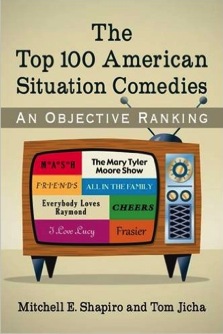
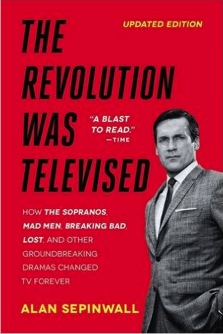
By ED BARK
@unclebarkycom on Twitter
People either keep asking me -- “When are you going to write a book?” -- or telling me, “You need to write a book.”
Maybe someday.
In the here and now, though, two standout TV critic colleagues, one now retired, have put their names to volumes that are well worth owning.
Alan Sepinwall’s updated edition of The Revolution Was Televised is the thoroughbred of the two. The trailblazing king of the re-cappers, who basically invented that domain with his weekly dissections of NYPD Blue episodes, has authored a tome that will stand the test of time. In short, it’s a landmark book.
Tom Jicha, former longtime TV critic of the Fort Lauderdale Sun Sentinel, has combined forces with University of Miami communications professor Mitchell E. Shapiro on The Top 100 American Situations Comedies: An Objective Ranking. Shapiro ranked the shows based on a four-pronged mathematical formula. Jicha then did the heavy lifting by writing concise and entertaining multi-page synopses of all 100 qualifiers.
Revolution Was Televised originated in 2012, when Sepinwall (currently writing for HitFix.com) came up with a list of 12 turn-of-the-century TV series that, in his view, “fundamentally altered the way TV dramas were both made and viewed.” But two series that made the cut, Mad Men and Breaking Bad, hadn’t yet completed their runs. So the updated version includes much more on those two shows in addition to “a bonus epilogue to discuss all the changes that have swept the TV business in the three years since this book was originally published.”
Besides the aforementioned, Sepinwall’s dynamic dozen range from HBO’s Oz to FX’s The Shield to The WB/UPN’s Buffy the Vampire Slayer to ABC’s Lost to NBC’s Friday Night Lights. He also pays homage to earlier pathfinders, including NBC’s Hill Street Blues (still the all-time game-changer in my view), CBS’ Wiseguy, ABC’s Twin Peaks and of course, that network’s NYPD Blue.
Sepinwall also has talked at length to the mostly men behind his Top 12, with only Buffy executive producer Joss Whedon declining to do a fresh interview for the book because of “an overwhelming schedule.” One of the principal takeaways is how hurly burly all of this could be. More often than not, the creators of these series improvised as they went along, without any pre-determined “bible” of how things would progress and end. Particularly in the case of Lost, tell us about it.
Many of these signature series also went through numerous rejections before a network finally adopted them. Mad Men ended up on a network (AMC) that mostly was known for screwing up its presentations of feature films by pockmarking them with commercials while rival TCM remains ad-free to this day.
Mad Men maestro Matthew Weiner, because of his ties to HBO’s The Sopranos, initially offered the series to that network. HBO executives now either deny passing on the series or cite the network’s full plate of other commitments. Breaking Bad got turned down by HBO, TNT and FX before AMC again stepped in.
The behind-the-scenes machinations, both before and during these pathfinding series, make Sepinwall’s book a valuable record of what really happened before time, self-serving egos and fading memories begin constructing alternative realities. Breaking Bad creator Vince Gilligan and his team are especially forthcoming, allowing the author to dig deep into the show’s creative cavities.
If Revolution Was Televised has a fault, it’s Sepinwall’s recurring wordiness. Brevity of sentence is not his strong suit. As with this rambling discourse on The Sopranos: “Whatever his motivations, whether at the start or in later seasons, Tony keeps going, and those sessions with Melfi -- along with other Soprano relatives (and Dr. Melfi herself) seeing their own therapists, Tony having increasingly strange and elaborate (and, among the fans, divisive) dreams, or Tony at times using other friends and relatives as surrogate shrinks -- helped add enormous depth, pathos, and at times comedy to what could have easily been a conventional, straightforward mob drama.”
But the prose also crackles, as with this notably briefer and better observation on 24: “The series consumed plot ideas like Pringles, and the best the writers could do was develop a sixth sense for when a story was about to exhaust itself, then quickly move on to the next thing.”
Not including the closing Acknowledgements, this is a 447-page book of considerable heft. It takes its place among some of the all-time great looks at how television works, playing in the same league as Les Brown’s 1971 Television: The Business Behind the Box; Bill Carter’s 1994 The Late Shift; and Tom Shales/James Andrew Miller’s 2002 Live From New York: An Uncensored History of Saturday Night Live.
The Top 100 American Situation Comedies is also a page-turner, although more conducive to one-show-at-a-time bathroom reading.
Prof. Shapiro has deployed four criteria to compile his list: ratings, longevity, Emmy nominations/wins and spinoffs.
Not surprisingly, the clear No. 1 sitcom is CBS’ All In the Family, an awards-laden ratings juggernaut that ran for nine seasons before morphing into Archie Bunker’s Place. It also spun off The Jeffersons, Maude and Good Times, which respectively rank 40th, 42nd and 116th (in an expanded Appendix of 377 “Qualifying” comedies).
Where this Top 100 list gets into trouble is the ratings criteria. For the most part, cable comedies simply do not stack up to most long-running broadcast network shows, although they’ve been gaining in recent years as venues multiply and divide audiences. The highest-ranked cable show is HBO’s Sex and the City in the 30th spot. Only nine other cable comedies make the top 100, the majority of them from HBO. Just one of those shows, Nickelodeon’s No. 94-ranked iCarly, has had a spinoff.
It would be better if the professor had kept longevity in the mix but dropped the ratings qualifier. It also would be better if The Danny Thomas Show, also known as Make Room For Daddy, didn’t end up in 14th place. True, it was a highly popular show (six times ranking in prime-time’s Top 10) with a surprising number of major Emmy nominations (20) and wins (5). But placing ahead of the likes of The Dick Van Dyke Show, The Andy Griffith Show, Taxi, Barney Miller and Roseanne just doesn’t seem to compute.
In this case, Jicha does the best with what he has, writing, “The Danny Thomas Show endured for 12 seasons (from 1953 to 1965) on two networks (ABC/CBS). One simple explanation -- it was good during a lot of seasons when most of television wasn’t very good.”
Jicha weaves both context and a show’s content into his summations. He notes that while NBC’s Seinfeld (No. 10) didn’t have any spinoffs, it did help to launch the careers of female guest stars such as Teri Hatcher (Desperate Housewives); Courteney Cox (Friends); Jane Leeves (Frasier); Anna Gunn (Breaking Bad; Debra Messing (Will & Grace); Kristin Davis (Sex and the City); and Jamie Gertz (Still Standing).
Of ABC’s Family Matters (which clings to the No. 100 spot ahead of Leave It to Beaver), Jicha writes: “No comedy series in the history of television was more re-imagined from its original blueprint because of a late-arriving, fringe character who was supposed to appear only once.” That would be Jaleel White’s show-stealing Steve Urkel.
Both The Revolution Was Televised and The Top 100 American Situation Comedies are paperback originals that for the most part aren’t readily available in stores.
Retailing for $16.99, you can order Sepinwall’s instant classic at a lower price here.
The Jicha/Shapiro compendium retails for (yikes) $39.95. That asking price is still holding firm on Amazon, but go here if you’re willing to buy in. It’s considerably cheaper on Kindle, though.
Email comments or questions to: unclebarky@verizon.net
Richard Dreyfus, Blythe Danner make the Madoffs go 'round in ABC miniseries
02/02/16 01:00 PM
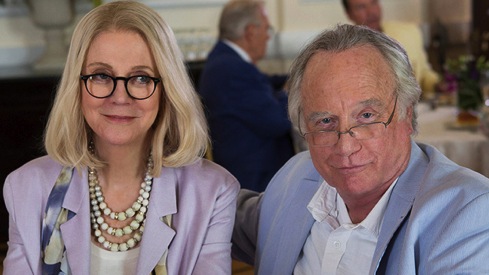
Premiering: Wednesday and Thursday, Feb. 3-4, at 7 p.m. (central) on ABC
Starring: Richard Dreyfuss, Blythe Danner, Michael Rispoli, Peter Scolari, Tom Lipinski, Andrew Deferrari, Erin Cummings, Frank Whaley, Charles Grodin, Lewis Black
Directed by: Raymond De Felitta
By ED BARK
@unclebarkycom on Twitter
A notably fleshy Richard Dreyfuss, now 68, has let himself grow into the role of the world’s most notorious, pear-shaped Ponzi schemer.
Very ably assisted by Blythe Danner as his wife, Ruth, Dreyfuss inhabits Bernie Madoff without vanity and with considerable impact in ABC’s two-part, four-hour Madoff.
It’s a white collar true crime story that almost assuredly will have no appeal whatsoever for younger viewers. Which makes it an odd fit for today’s ABC and probably better suited as an “event miniseries” on HBO or basic cable’s History or National Geo networks. But ABC it is, and there’s at least a solid chance for some acting Emmys even if the ratings go into the red.
Dreyfuss is all over this role, whether narrating, chortling or going nearly mad as the stock market collapse of 2008 closes in on him and the many investors he’s bilked.
“As long as deposits out-pace withdrawals, you can live like a king,” Dreyfuss as Madoff says in Wednesday’s opening minutes.
Directed by Raymond De Felitta (City Island), this tale of excesses come home to roost carries the standard “Inspired by true events” disclaimer. Viewers also are informed that “some characters, businesses, scenes and chronologies have been invented, altered or consolidated for dramatic purposes.” But if you break into any patches of disbelief, it’s too late to call a script doctor.
Madoff errs most egregiously at the close of Part 1, with Bernie sensing doom approaching during what’s supposed to be the happy occasion of his niece’s expensive wedding. Securities and Exchange Commission officials take turns glaring at him like coyotes after Madoff’s office records have been investigated at length. Is the jig up? Are they intent on humiliating him publicly before hauling Madoff away? It’s meant to be the cliffhanger hook for Part 2 in a drama bereft of fights, car chases, gunfire or any other physical action scenes. But sorry, no sale. The sequence comes off as largely laughable and wholly “invented.”
Otherwise, a typical weekend at Bernie’s includes sumptuous family dinners at his posh oceanside home. The self-described financial “magician” is usually joined by wife Ruth, their sons, Mark and Andrew (Tom Lipinski, Danny Deferrari) and Bernie’s jittery younger brother, Peter (Peter Scolari), who also serves as his chief compliance officer.
But the true second lieutenant is Frank DiPascali (Michael Rispoli from The Sopranos), who runs a secret 17th floor office and is a fully complicit co-conspirator. The drama strongly suggests that Ruth, Mark and Andrew were totally in the dark while an increasingly guilty Peter mostly looked the other way.
Initially nipping at Bernie’s heels is Harry Markopolos (Frank Whaley), a frustrated fraud investigator who thinks he has his prey nailed but can’t make the sale to higher-ups. Bernie always seems to be a bob and a weave ahead of everyone else while hugely rich investors keep flocking to him. One of them is Carl Shapiro (Charles Grodin with an “and Charles Grodin” credit), who says dismissively in Part 1, “Millions are for schleppers. You gotta go for billions.”
Unfortunately, Grodin’s role amounts to perhaps two minutes of screen time, with ranting comedian Lewis Black likewise very little seen as another greedy investor.
This leaves Dreyfuss with lots to do from start to stop. And his performance is worth the price of his eventual grudging admissions. He still has the chops, as does Danner as a dutiful wife who sometimes chafes but enjoys the creature comforts her husband has provided them. But alas, the Madoff family can’t quite seem to kick the cancer gene, which is sometimes used as a rather heavy-handed metaphor for rotting from within.
One and all of course watch ABC News for the latest on the escalating stock market and investment company meltdowns. This allows the network to trot out news footage featuring the likes of Charles Gibson, George Stephanopoulos, Diane Sawyer, Brian Ross and Terry Moran.
In the end, Bernie Madoff is depicted as a fall-on-his-sword criminal who wanted to shield his family and Di Pascali from prosecution but had no regrets about bilking thousands of investors large and small. After all, he reasons, they were gladly part of the process during all of those happy returns.
Madoff remains incarcerated, with a release date of 2139 that he’s not likely to see. Assuming they have ABC on the prison TV menu, perhaps he’ll enjoy watching Dreyfuss play him to the hilt. It’s a juicy part for an aging actor who’s likewise fortunate to have the always good Danner along for the ride. Together they make Madoff a watchable yet curious undertaking for a network that would rather be the broadcast home of Marvel action heroes but still can’t seem to make those particular investments pay off.
GRADE: B
Email comments or questions to: unclebarky@verizon.net
